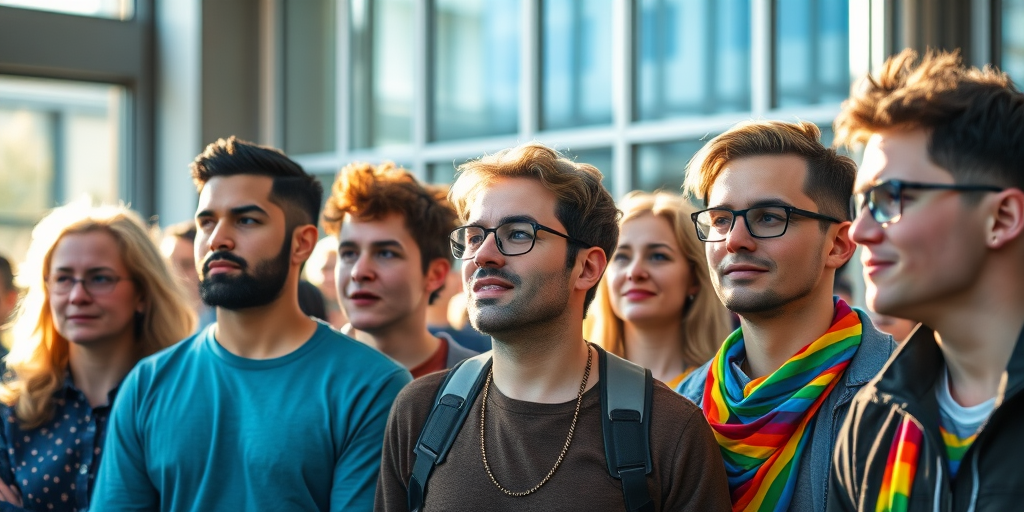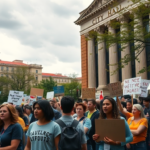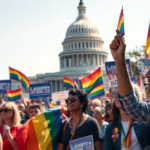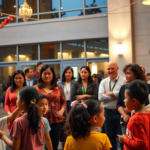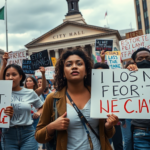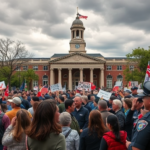MCC Hosts Conference to Embrace LGBTQ+ Community
Monroe Community College (MCC) in Rochester, New York, took a definitive step towards inclusion and understanding by hosting a diversity conference focused on the LGBTQ+ community. The conference, held last Friday morning at the college’s downtown campus, was designed to promote respect and foster a deeper understanding of the LGBTQ+ community among participants.
Community-Powered Embrace
Dr. Calvin Gantt, Vice President for Diversity, Equity, and Belonging at MCC, opened the conference by underscoring the importance of diversity, equity, and belonging. “These values are foundational to who we are as a people, and who we strive to be as a nation,” Gantt emphasized. His remarks set the tone for a day aimed at not only acknowledging but celebrating the spectrum of human experiences and identities present in today’s society.
The keynote speaker, V Spehar, known for their popular TikTok series “Under the Desk News,” brought a personal touch to the event. With approximately 3.7 million daily followers, Spehar shares current events through a unique lens, advocating for clarity and honesty. Their participation highlighted the principal objective of the conference: to promote inclusivity and lend support to the LGBTQ+ community through education and active engagement.
Local Impact and Community Interest
For residents of Rochester, the conference represents a significant stride toward a more inclusive community ethos. Sarah Johnson, an attendee and MCC student, shared her thoughts on the day’s events. “It’s heartening to see my college taking such initiative. The more we’re willing to understand and respect each other, the stronger our community becomes,” Johnson stated.
The event holds particular significance in a region like Rochester, where local impact can ripple through various community facets, from educational institutions to civic organizations and beyond. Similar events in the past have spurred important conversations on diversity and inclusion, making it a community interest that resonates with many residents.
Context and Connection to Community Challenges
Rochester has a colorful mosaic of cultures and histories, yet like many areas, it has faced challenges related to inequality and representation. Past local events, including the annual Rochester Pride Parade and multiple advocacy initiatives by grassroots organizations, have paved the way for such forums. These efforts have been instrumental in addressing ongoing issues concerning LGBTQ+ rights and the universal pursuit of equality.
Local organizations, such as The Out Alliance, have continually advocated for the betterment of LGBTQ+ people in the region. Allison Price, Executive Director of The Out Alliance, welcomed the conference’s goals and expressed optimism about its future implications. “Each step towards a more inclusive community is a win. We’re not just changing minds; we’re enriching lives,” Price noted.
Looking Forward: Towards an Inclusive Future
Participants and organizers alike hope that this conference marks the beginning of a broader, sustained effort to nurture inclusivity within Rochester and beyond. The potential implications are significant, potentially influencing policy changes, increasing support for LGBTQ+ youth, and integrating comprehensive diversity training into education systems.
“Our work doesn’t stop here,” Dr. Gantt remarked. “This is about creating an environment where everyone feels seen, heard, and valued. We need continuous engagement and commitment to ensure meaningful change.”
Furthermore, local educational institutions might see increased collaboration with the LGBTQ+ community, through curriculum updates or joint initiatives, strengthening their role as catalysts for social change. The success of MCC’s event could inspire similar gatherings across other community colleges in New York State, leading to a shared vision of inclusivity and equality.
Balanced Perspectives and Community Resources
While the conference was widely praised, it is essential to recognize the diversity of opinions within any community. Some attendees pointed out the need for continuous action beyond dialogue. “Conferences like these are vital, but they must be paired with tangible change,” said resident Tom Fraser. “Let’s support these discussions with policies that truly benefit the LGBTQ+ community.”
For local readers interested in further engagement, Monroe Community College has made available resources from the conference, including talks and workshops, through their website. Additionally, further support can be found via local LGBTQ+ organizations that provide educational resources and community support.
As the conference winds down and its impacts begin to unfold, it stands as a testament to the potential of community-driven initiatives. By nurturing understanding and inclusion, events like these can transform local impact into lasting positive change. Through persistence and partnership, communities can not only embrace diversity but thrive within it.

